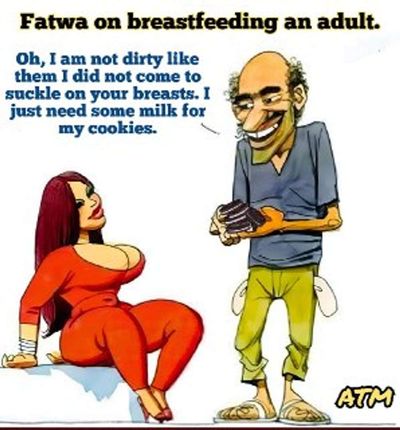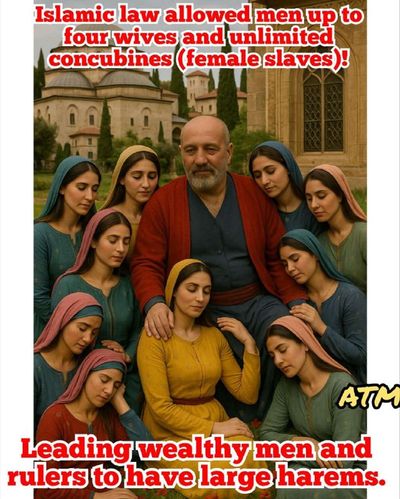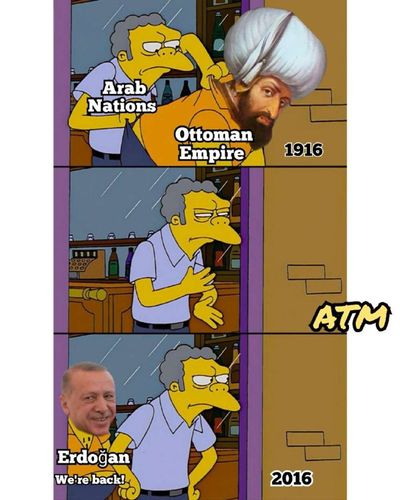
Анатолий Шарий

Реальний Київ | Украина

Лёха в Short’ах Long’ует

Труха⚡️Україна

Николаевский Ванёк

Инсайдер UA

Реальна Війна | Україна | Новини

Лачен пише

Nairaland Pulse | News

Анатолий Шарий

Реальний Київ | Украина

Лёха в Short’ах Long’ует

Труха⚡️Україна

Николаевский Ванёк

Инсайдер UA

Реальна Війна | Україна | Новини

Лачен пише

Nairaland Pulse | News

Анатолий Шарий

Реальний Київ | Украина

Лёха в Short’ах Long’ует

Arabic Translated Memes page
I am Arab born & bred. I left Islam. I create memes to show a side of Islam most people do not know. All Copyright free.
TGlist рейтингі
0
0
ТүріҚоғамдық
Растау
РасталмағанСенімділік
СенімсізОрналасқан жері
ТілБасқа
Канал құрылған күніГруд 27, 2021
TGlist-ке қосылған күні
Січ 12, 2025Қосылған топ
AT
Arabic Translated Memes page chat
15
Рекордтар
19.05.202523:59
1.1KЖазылушылар03.09.202423:59
0Дәйексөз индексі19.05.202507:49
2051 жазбаның қамтуы19.05.202507:49
492Жарнамалық жазбаның қамтуы26.04.202523:59
44.44%ER14.05.202504:21
18.76%ERR26.04.202507:39
Unlike any previous minorities, Islam refuses to integrate and adopt, yet seeks to expand and dominate. As Exmuslims, history will testify that we warned you!
01.05.202504:27
You want to know who is the author of the Quran, check chapter 33:
Zaynab was married to Zaid, Muhammad's adopted son. One day Muhammad paid a visit to Zaid's house. Not expecting Muhammad, , Zaynab answered the door dressed in a revealing garment, and Muhammad is quoted in Tafsir Al Qurtubi and Al Tabari as saying:
سبحان مقلب القلوب
"Glory to the one who turns the hearts"
When Zaid learned of the Prophet's comments, he felt obliger to divorce her so Muhammad could marry her.
You can. Read this in the Tafsir here:https://quran.com/en/al-ahzab/37/tafsirs check the classic Arabic Tafsir. Later, Ibn Kathir and modern scholars tried to down play this claiming this is weak narration.
It was controversial among the Arabs, not just for marrying his first cousin but for taking his adopted son's wife. Shortly after, Muhammad received few convenient revelations:
First, reform adoption from being father / son relationship to just "caretaker". A tradition of over thousands of years in Arabia and other heavenly books with huge implications on children such as missing out on father family title and inheritance - profoundly changing relationships!
"Let your adopted children keep their family names. That is more just in the sight of Allah. But if you do not know their fathers, then they are ˹simply˺ your fellow believers...." Quran 33:5
A few verses later...
"... So when Zaid had accomplished his desire from her (i.e. finished with her), We gave her to you in marriage.... And God's Command must be fulfilled." Quran 33:37
And just like that Allah commands Muhammad to marry Zaynab. And what happened the first night he married her? Nailed her!
Apologist: For context, Zaid and Zaynab were having marital problems and Muhammad was just trying to help. Is this the solution now, when a couple have marital problems, divorce and hand her over to your relatives? Is she a camel? And this martial dispute made its way to the eternal holy book? Allah who knows the future, did not think of banning adoption- say 20 years earlier before Muhammad adopted Zaid as his son? Or, a few years early Muhammad adopted Salim as a son and Allah said nothing!
Later, when Muhammad kept getting women offering themselves to him, and Aisha made a scene, so another verse came 33:50 saying he can marry any woman he wants to exceed the four wives limit. Prompting Aisha's famous words: "...It seems to me that your Lord hastens to satisfy your desire."
Sahih Muslim 1464 a https://sunnah.com/muslim:1464a
Sahih al-Bukhari 4788
https://sunnah.com/bukhari:4788
That is why Muhammad was able to have nine wives and this privilege is only for him!
In 33:53, "Allah" tells visitors Muhammad is shy and busy. Once you have dinner, leave. Wait more, when Muhammad dies, his wives are NEVER allowed to be with another man!
And 33:21 Making him the BEST example to follow!The guy who own slaves, women war bounty sex slaves, marries a child, and spends his adult life at war! That's the best example?
Did you notice that all this is in the same chapter? Chapter 33 is this book for Allah or Muhammad?
Zaynab was married to Zaid, Muhammad's adopted son. One day Muhammad paid a visit to Zaid's house. Not expecting Muhammad, , Zaynab answered the door dressed in a revealing garment, and Muhammad is quoted in Tafsir Al Qurtubi and Al Tabari as saying:
سبحان مقلب القلوب
"Glory to the one who turns the hearts"
When Zaid learned of the Prophet's comments, he felt obliger to divorce her so Muhammad could marry her.
You can. Read this in the Tafsir here:https://quran.com/en/al-ahzab/37/tafsirs check the classic Arabic Tafsir. Later, Ibn Kathir and modern scholars tried to down play this claiming this is weak narration.
It was controversial among the Arabs, not just for marrying his first cousin but for taking his adopted son's wife. Shortly after, Muhammad received few convenient revelations:
First, reform adoption from being father / son relationship to just "caretaker". A tradition of over thousands of years in Arabia and other heavenly books with huge implications on children such as missing out on father family title and inheritance - profoundly changing relationships!
"Let your adopted children keep their family names. That is more just in the sight of Allah. But if you do not know their fathers, then they are ˹simply˺ your fellow believers...." Quran 33:5
A few verses later...
"... So when Zaid had accomplished his desire from her (i.e. finished with her), We gave her to you in marriage.... And God's Command must be fulfilled." Quran 33:37
And just like that Allah commands Muhammad to marry Zaynab. And what happened the first night he married her? Nailed her!
Apologist: For context, Zaid and Zaynab were having marital problems and Muhammad was just trying to help. Is this the solution now, when a couple have marital problems, divorce and hand her over to your relatives? Is she a camel? And this martial dispute made its way to the eternal holy book? Allah who knows the future, did not think of banning adoption- say 20 years earlier before Muhammad adopted Zaid as his son? Or, a few years early Muhammad adopted Salim as a son and Allah said nothing!
Later, when Muhammad kept getting women offering themselves to him, and Aisha made a scene, so another verse came 33:50 saying he can marry any woman he wants to exceed the four wives limit. Prompting Aisha's famous words: "...It seems to me that your Lord hastens to satisfy your desire."
Sahih Muslim 1464 a https://sunnah.com/muslim:1464a
Sahih al-Bukhari 4788
https://sunnah.com/bukhari:4788
That is why Muhammad was able to have nine wives and this privilege is only for him!
In 33:53, "Allah" tells visitors Muhammad is shy and busy. Once you have dinner, leave. Wait more, when Muhammad dies, his wives are NEVER allowed to be with another man!
And 33:21 Making him the BEST example to follow!The guy who own slaves, women war bounty sex slaves, marries a child, and spends his adult life at war! That's the best example?
Did you notice that all this is in the same chapter? Chapter 33 is this book for Allah or Muhammad?
11.05.202520:33
Untold Islamic History:
During the height of the Ottoman Empire, a particularly grim method of execution was reserved for certain palace women: being sewn into weighted sacks and cast into the Bosphorus Strait. This form of punishment, known as “sack drowning” (Turkish: sorguç torbası), was often carried out in secrecy to preserve the appearance of royal dignity while eliminating perceived threats or dishonored women—most commonly concubines accused of adultery or betrayal.
One of the most chilling episodes occurred in 1648 under the rule of Sultan Ibrahim I, notoriously nicknamed Ibrahim the Mad due to his erratic behavior and mental instability. Suspecting his harem of infidelity, he allegedly ordered the mass execution of 280 concubines in a single day. The women were sewn into sacks and drowned in the waters of the Bosphorus.
According to accounts, only one woman survived, reportedly rescued by sailors from a passing French ship, who witnessed the brutal scene. This incident not only marked a dark chapter in Ottoman court history but also contributed to Ibrahim’s eventual deposition and assassination the same year. The event underscores the vulnerability of women in the imperial harem and the extremes of unchecked power under an unstable ruler.
During the height of the Ottoman Empire, a particularly grim method of execution was reserved for certain palace women: being sewn into weighted sacks and cast into the Bosphorus Strait. This form of punishment, known as “sack drowning” (Turkish: sorguç torbası), was often carried out in secrecy to preserve the appearance of royal dignity while eliminating perceived threats or dishonored women—most commonly concubines accused of adultery or betrayal.
One of the most chilling episodes occurred in 1648 under the rule of Sultan Ibrahim I, notoriously nicknamed Ibrahim the Mad due to his erratic behavior and mental instability. Suspecting his harem of infidelity, he allegedly ordered the mass execution of 280 concubines in a single day. The women were sewn into sacks and drowned in the waters of the Bosphorus.
According to accounts, only one woman survived, reportedly rescued by sailors from a passing French ship, who witnessed the brutal scene. This incident not only marked a dark chapter in Ottoman court history but also contributed to Ibrahim’s eventual deposition and assassination the same year. The event underscores the vulnerability of women in the imperial harem and the extremes of unchecked power under an unstable ruler.


11.05.202520:32
20.04.202520:19
Delighted to report the first four chapters of the book are now complete. Supported by @exmuslim_norway The #101ReasonsWhyWeLeft is free to read the first 55 reasons. Easy to follow menu:
https://exmuslimmemes.com/the-101-reasons-why-we-left-islam/
Chapter One, Abrogation:
Reason 1: Abrogation of Peaceful verses
Reason 2: Abrogation of stoning and breastfeeding for adults
Reason 3: Abrogation of Alcohol
Reason 4: Abrogation of Temporary Marriages
Reason 5: Abrogation of direction of prayer
Chapter Two, Women in Islam:
Reason 6: Underage marriages
Reason 7: Excuses for underage marriages
Reason 8: Owning women as War bounty slaves
Reason 9: Having sex without marriage with War Bounty slaves
Reason 10: Women's inheritance
Reason 11: Women's Marriages
Reason 12: Divorce & Halal Marriages
Reason 13: Women's Intellect
Reason 14: The story of the Hijab
Reason 15: Polygamy in Islam
Reason 16: Disciplining Women
Reason 17: Contempt for Women
Reason 18: Is Islam Feminist?
Chapter Three, Scientific errors
Reason #19 Inheritance error in the Quran
Reason #20: Flat Earth in the Quran
Reason #21: Seven Heavens and Seven Earths
Reason #22: The Sun Prostrates to Allah Every Night
Reason #23: The Sun has a Setting point!
Reason #24: Geocentric Earth
Reason #25: Sperm Originates from the Backbone and Ribs
Reason #26: Embryology Process
Reason #27: The Background Story for Embryology Verses
Reason #28: Man is Made from Sounding Clay
Reason #29: Allah of Rain, Wind, and Thunder – Allah of Gaps!
Reason #30: Islamic Medicine – Dates to Protect from Poison
Reason #31: All things are made in pairs!
Reason #32: Meteorites are stars that Allah throws onto the devil!
Reason #33: Adam is 60 arms (30 meters) tall!
Reason #34: Allah holds the Sky from falling!
Reason #35: Allah Created Mountains to “Stop Earth Shaking”
Reason #36: What came first the Earth or the Universe?
Reason #37: Quran suggests ants can have conversations!
Reason #38: Debunking Iron falling from the sky as a scientific miracle of the Quran.
Reason #39: Cattles sent from the sky!
Reason #40: Debunking the claim “All life comes from Water” as a miracle in the Quran.
Reason #41: Debunking “The Universe Expanding” is in the Quran.
Reason #42: All the Scientific Miracles of the Quran Debunked.
Chapter Four, Islamic history:
Reason #43: The Destruction of the Kaaba!
Reason #44: The Smashing of the Blackstone!
Reason #45: Did Islam ban slavery?
Reason #46: Slaves can be any colour!
Reason #47: What stopped slavery in the Islamic world?
Reason #48: Infighting started the moment The Prophet died!
Reason #49: Kaaba’s 360 Idols are a symbol of coexistence.
Reason #50: Quran standardisation is a human process.
Reason #51: Quran Perfect Preservation (Debunked)
Reason #52: The story of Alexander the Great (Zul-Qarnain)
Reason #53: Mary or Mariam, how did the Quran get this wrong?
Reason #54: Allah sent a messenger to “Every Nation”.
Reason #55: The year of the “Elephant” in Quran 105.
Chapter 5: Failed Prophecies (Book likely to be ready by Christmas 2025)
https://exmuslimmemes.com/the-101-reasons-why-we-left-islam/
Chapter One, Abrogation:
Reason 1: Abrogation of Peaceful verses
Reason 2: Abrogation of stoning and breastfeeding for adults
Reason 3: Abrogation of Alcohol
Reason 4: Abrogation of Temporary Marriages
Reason 5: Abrogation of direction of prayer
Chapter Two, Women in Islam:
Reason 6: Underage marriages
Reason 7: Excuses for underage marriages
Reason 8: Owning women as War bounty slaves
Reason 9: Having sex without marriage with War Bounty slaves
Reason 10: Women's inheritance
Reason 11: Women's Marriages
Reason 12: Divorce & Halal Marriages
Reason 13: Women's Intellect
Reason 14: The story of the Hijab
Reason 15: Polygamy in Islam
Reason 16: Disciplining Women
Reason 17: Contempt for Women
Reason 18: Is Islam Feminist?
Chapter Three, Scientific errors
Reason #19 Inheritance error in the Quran
Reason #20: Flat Earth in the Quran
Reason #21: Seven Heavens and Seven Earths
Reason #22: The Sun Prostrates to Allah Every Night
Reason #23: The Sun has a Setting point!
Reason #24: Geocentric Earth
Reason #25: Sperm Originates from the Backbone and Ribs
Reason #26: Embryology Process
Reason #27: The Background Story for Embryology Verses
Reason #28: Man is Made from Sounding Clay
Reason #29: Allah of Rain, Wind, and Thunder – Allah of Gaps!
Reason #30: Islamic Medicine – Dates to Protect from Poison
Reason #31: All things are made in pairs!
Reason #32: Meteorites are stars that Allah throws onto the devil!
Reason #33: Adam is 60 arms (30 meters) tall!
Reason #34: Allah holds the Sky from falling!
Reason #35: Allah Created Mountains to “Stop Earth Shaking”
Reason #36: What came first the Earth or the Universe?
Reason #37: Quran suggests ants can have conversations!
Reason #38: Debunking Iron falling from the sky as a scientific miracle of the Quran.
Reason #39: Cattles sent from the sky!
Reason #40: Debunking the claim “All life comes from Water” as a miracle in the Quran.
Reason #41: Debunking “The Universe Expanding” is in the Quran.
Reason #42: All the Scientific Miracles of the Quran Debunked.
Chapter Four, Islamic history:
Reason #43: The Destruction of the Kaaba!
Reason #44: The Smashing of the Blackstone!
Reason #45: Did Islam ban slavery?
Reason #46: Slaves can be any colour!
Reason #47: What stopped slavery in the Islamic world?
Reason #48: Infighting started the moment The Prophet died!
Reason #49: Kaaba’s 360 Idols are a symbol of coexistence.
Reason #50: Quran standardisation is a human process.
Reason #51: Quran Perfect Preservation (Debunked)
Reason #52: The story of Alexander the Great (Zul-Qarnain)
Reason #53: Mary or Mariam, how did the Quran get this wrong?
Reason #54: Allah sent a messenger to “Every Nation”.
Reason #55: The year of the “Elephant” in Quran 105.
Chapter 5: Failed Prophecies (Book likely to be ready by Christmas 2025)


20.04.202520:18
21.04.202506:53
The Golden Age of Islam, typically dated from the 8th to the 13th century, marked a flourishing of culture, science, and intellectual life under the Abbasid Caliphate, particularly centered in Baghdad’s House of Wisdom. This period shift away from expansion and religion and saw a gradual shift where worldly pursuits such as philosophy, art, music, and even wine-drinking became prominent, often diverging from strict religious fundamentalism.
Art and music, often seen as haram, thrived under caliphal support. Music flourished in courts and urban centers, with instruments like the oud, qanun, and ney shaping a rich tradition. Poets and musicians, such as Abu Nuwas, celebrated wine, love, and revelry in their compositions, performed in taverns and palaces. Sufi mysticism further elevated music as a spiritual practice, despite occasional clerical disapproval.
Philosophy—especially Greek philosophy translated into Arabic—was central. Thinkers like Al-Farabi, Avicenna (Ibn Sina), and Averroes (Ibn Rushd) integrated Aristotelian logic with Islamic theology, often provoking backlash from religious scholars who also considered Philosophy haram! Intellectual freedom extended at times to open discussions of atheism, apostasy, and criticism of religious dogma. Poets like Abu Nuwas famously celebrated wine and earthly pleasures, reflecting elite culture’s growing secularism. Nuwas’s bacchanalian verses and tales of taverns in Baghdad highlight a permissive attitude toward alcohol, despite religion. This reflected a broader cultural openness, with interfaith mingling and a focus on worldly pleasures over religion.
This cultural high point ended when Mongol sack of Baghdad in 1258, which shattered the Abbasid political power. This was seen as self fullfiling prophecy of the "end of time" but nothing came of it. Other factors included internal theological backlash—led by scholars like Al-Ghazali—who argued that excessive philosophy, art, and liberalism endangered faith. The rise of more conservative movements also played a role in reasserting fundamentalist control. And we went back to the dark ages.
So, what really bought about Golden Age of Islam was distancing ourselves from the fundamentals of Islam, openness, patronage, and cultural integration rather that cultural domination or fundamentalism of Islam.
Art and music, often seen as haram, thrived under caliphal support. Music flourished in courts and urban centers, with instruments like the oud, qanun, and ney shaping a rich tradition. Poets and musicians, such as Abu Nuwas, celebrated wine, love, and revelry in their compositions, performed in taverns and palaces. Sufi mysticism further elevated music as a spiritual practice, despite occasional clerical disapproval.
Philosophy—especially Greek philosophy translated into Arabic—was central. Thinkers like Al-Farabi, Avicenna (Ibn Sina), and Averroes (Ibn Rushd) integrated Aristotelian logic with Islamic theology, often provoking backlash from religious scholars who also considered Philosophy haram! Intellectual freedom extended at times to open discussions of atheism, apostasy, and criticism of religious dogma. Poets like Abu Nuwas famously celebrated wine and earthly pleasures, reflecting elite culture’s growing secularism. Nuwas’s bacchanalian verses and tales of taverns in Baghdad highlight a permissive attitude toward alcohol, despite religion. This reflected a broader cultural openness, with interfaith mingling and a focus on worldly pleasures over religion.
This cultural high point ended when Mongol sack of Baghdad in 1258, which shattered the Abbasid political power. This was seen as self fullfiling prophecy of the "end of time" but nothing came of it. Other factors included internal theological backlash—led by scholars like Al-Ghazali—who argued that excessive philosophy, art, and liberalism endangered faith. The rise of more conservative movements also played a role in reasserting fundamentalist control. And we went back to the dark ages.
So, what really bought about Golden Age of Islam was distancing ourselves from the fundamentals of Islam, openness, patronage, and cultural integration rather that cultural domination or fundamentalism of Islam.


11.05.202506:40


15.05.202504:20


13.05.202504:18


16.05.202503:04
09.05.202503:42
12.05.202503:35
They say your family know you better than anyone else... Let's see what Muhammad's family made up of his message?
Abu Talib, the Prophet’s paternal uncle, he raised Muhammad when his father died before he was born and his mother abandoned him as a baby. He never embraced Islam, despite the Prophets repeated attempts. On his deathbed, he reportedly refused to recite the shahada, choosing to remain on the path of his faith.
Abu Lahab, another paternal uncle, openly opposed Muhammad, he became a fierce adversary. Abu Lahab did not believe his nephew and mocked him. His opposition was so strong that he was condemned in the Qur’an (Surah Al-Masad).
Ubaidullah ibn Jahsh, the Prophet’s cousin, initially accepted Islam and emigrated to Ethiopia but later converted to Christianity. His apostasy is often seen as a result of personal conviction or influence from the Christian environment. But let's face it, he had a choice between Islam and hearing it from his uncle who is a Prophet - and he saw through it. He lived out the rest of his life there and never returned to Islam.
Incidentally, his other relatives:
Ali ibn Abi Talib (cousin), Ja’far ibn Abi Talib (his uncle), and Abbas ibn Abd al-Muttalib (uncle), all later rejected main stream Islam staring the Shia strand as Ahla Albeit (Household of Muhammad).
It is all a mess.
Abu Talib, the Prophet’s paternal uncle, he raised Muhammad when his father died before he was born and his mother abandoned him as a baby. He never embraced Islam, despite the Prophets repeated attempts. On his deathbed, he reportedly refused to recite the shahada, choosing to remain on the path of his faith.
Abu Lahab, another paternal uncle, openly opposed Muhammad, he became a fierce adversary. Abu Lahab did not believe his nephew and mocked him. His opposition was so strong that he was condemned in the Qur’an (Surah Al-Masad).
Ubaidullah ibn Jahsh, the Prophet’s cousin, initially accepted Islam and emigrated to Ethiopia but later converted to Christianity. His apostasy is often seen as a result of personal conviction or influence from the Christian environment. But let's face it, he had a choice between Islam and hearing it from his uncle who is a Prophet - and he saw through it. He lived out the rest of his life there and never returned to Islam.
Incidentally, his other relatives:
Ali ibn Abi Talib (cousin), Ja’far ibn Abi Talib (his uncle), and Abbas ibn Abd al-Muttalib (uncle), all later rejected main stream Islam staring the Shia strand as Ahla Albeit (Household of Muhammad).
It is all a mess.


06.05.202503:35
14.05.202506:02
Көбірек мүмкіндіктерді ашу үшін кіріңіз.











